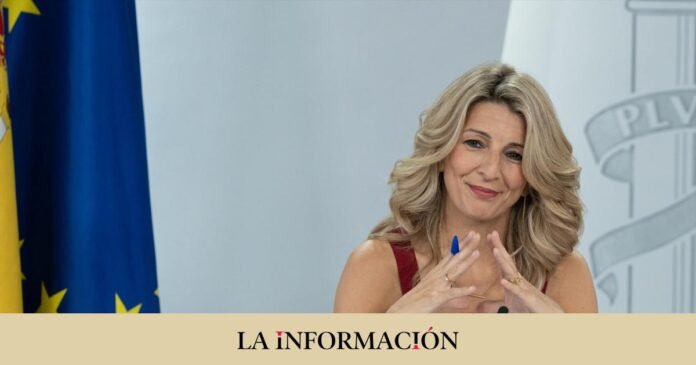The fourth ‘tracking’ of the general elections, prepared by the DYM Institute for ‘Information’, shows a 71% rejection among Spaniards of one of the star proposals of this electoral campaign: the “universal inheritance” of 20,000 euros proposed by Add, effectively for all those Spaniards who turn 23, and that would be used to help them at the beginning of their professional career or to become independent, among other possibilities. What would be financed with a new tax on large fortunes. It is an adaptation of the system proposed by the media French economist Thomas Piketty in his book ‘Capital and Ideology’: an inheritance for 25-year-olds, equivalent to 60% of the average wealth (about 120,000 euros), and that would be paid for through a new property tax.
It also generates a majority rejection – 54.8% – of another quite repeated proposal in this campaign, especially from the extreme right: the repeal of the Gender Violence Law. While other measures put on the table these days by the candidates of the main political parties arouse more or less majority agreements, such as the recovery of the crime of sedition (52.8%), the increase in maternity and paternity leave from 16 to 20 months (67.6%) and the tightening of penalties for embezzlement of public funds that receives the applause of 89.2% of those surveyed.
The DYM Institute has also questioned the Spaniards about what effects a coalition government between PSOE and Sumar will have, as well as another between PP and Vox. Regarding the first formula, the majority of Spaniards believe that it would get along well with the European Union (EU) and that relations with Catalonia and the Basque Country would not deteriorate. More doubts are offered to those surveyed if we would be facing a good government and a stable executive. The majority reject both statements with 38.5% and 37.4%, respectively.
Skepticism with the PP-Vox coalition
Regarding the second formula, a hypothetical Feijoo-Abascal tandem, 43.9% of Spaniards believe that the relationship with the Basque Country and Catalonia would deteriorate. While only 25.6% believe that they will have a good relationship with Brussels and only 21.2% agree that they would be a stable and cohesive executive. In this line, a percentage of just over 20%, are confident that the coalition between the popular and those of Santiago Abascal would be a good government.
In a similar vein, the Spaniards reinforce their commitment to the oldest bipartisanship: the preferred options for the Spaniards after 23-J are, by far, the formation of solo governments of the PP (27.1%) and the PSOE ( 21.8%.). At a greater distance is a coalition between PSOE and Sumar that is supported by 16.3%, as well as an Executive that brings together the popular with those of Abascal, an option that barely arouses the applause of 12% of Spaniards. Very minority is the support for the current formula of Government, read a Government of the PSOE and Sumar supported by other parties. Only 5.1% of those surveyed prefer it. An analogous situation, but with PP and Vox in the Council of Ministers, it is only supported by 1.6%.
Asked about the results of the upcoming elections, the majority of Spaniards bet on a victory for the right-wing bloc (PP + Vox) up to 54.8%, although they are very divided on the magnitude of the victory, well with a small advantage (27, 8%) or if the margin will be higher (27%). Only 26.8% trust in the success of the socialists and their allies (Add, above all) and, most of them bet, for a minimum advantage.
Intention to vote and the ‘note’ of the candidates
The hemicycle that 23-J will redraw in this new installment of the ‘tracking’ of the DYM Institute sharpens the trends reflected in the previous study: a partial victory of the PP, which with Vox would approach or add the absolute majority in the Congress of Deputies and a constant fight, inch by inch, for the third place in which Sumar and Vox would probably tie. In this installment, those of Vox start with a slight advantage. The popular ones move in a range of between 138 and 142 seats, while the socialists are attributed between 105 and 108 deputies for between 36 and 39 Vox seats. Sumar, which continues its struggle to surpass those of Abascal, would be between 32 and 35 seats. The rest of the formations, among which there are several allies of the PSOE such as ERC, would be made with between 32 and 35 deputies.
What the ‘tracking’ of the DYM Institute for Information makes clear is that PSOE and Sumar do not reach an absolute majority (176 parliamentarians), although both formations achieved their best results (108 socialist deputies plus 35 from Sumar). As is the case in this legislature, they would need the help of other minorities such as Esquerra Republicana, Bildu or the PNV.
With respect to the previous delivery of the study, the majority opinion that bets on the need for a change of government is maintained. Almost 6 out of 10 Spaniards, 59.5%, confirm this opinion. Compared to 27.7% who are determinants of continuity. The valuation of the main candidates for Moncloa remains stable. None of them approve, although Alberto Núñez Feijoo (PP) consolidates as the most valued with 4.1 points out of ten, followed by Yolanda Díaz (Sumar) and the current Prime Minister Pedro Sánchez (PSOE) with 4. The president From Vox, Santiago Abascal, is the one that arouses the least sympathy for one more installment and receives a rating of 2.5. However, 42% of Spaniards continue to prefer Sánchez as Prime Minister compared to 37.1% who opt for Feijoo (PP).

